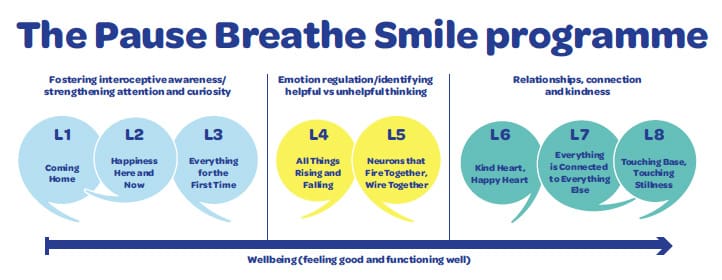I’ve recently completed the Pause Breathe Smile (PBS) mindfulness programme, and it has been an great experience. Through the six lessons, I gained new tools for calmness, focus, and self-awareness. These lessons have not only helped me personally but also boosted my confidence in leading mindfulness practices with my class.
Pause Breathe Smile is rooted in New Zealand’s identity and is deeply connected to Te Whare Tapa Whā, a Māori model of wellbeing. This has made the programme even more meaningful, as it ties in with Aotearoa’s culture and can be used in both mainstream and Māori immersion classrooms. Since 2015, PBS has been developed with experts to create resources in te reo Māori, including updated handbooks, audio guides, and videos for mindfulness exercises.

What I Learned :
The PBS programme consists of six lessons, each designed to build mindfulness and awareness. Each lesson begins and ends with a karakia (prayer) to help centre the mind. After completing the lessons, I feel more confident in applying mindfulness in my own life and teaching it to my students.
Lesson 1: Introduction to Mindfulness
The first lesson taught me the basics of mindfulness and the importance of mindful breathing. It introduced me to the first foundation of mindfulness—awareness of my body.
Lesson 2: Finding Calm with Breath and Body Awareness
This lesson helped me understand how to use my breath to activate calmness in my body. It deepened my awareness of how my body responds to stress and how to calm it.
Lesson 3: Gratitude and Beginner’s Mind
I learned how practising gratitude can support mindfulness and how to adopt a “Beginner’s Mind,” which means staying open, curious, and non-judgmental.
Lesson 4: Awareness of Feelings
This lesson taught me how to be more aware of my emotions and how to stay present, even when I feel upset or distracted. It helped me develop better emotional regulation.
Lesson 5: Understanding and Regulating Emotions
In this lesson, I learned how to better understand my emotions and moods and how to use mindfulness to self-regulate and stay calm in difficult situations.
Lesson 6: Loving-Kindness and Awareness of Thoughts
The final lesson introduced loving-kindness and the power of being compassionate towards myself and others. I also learned how to become more aware of my thoughts and how to manage negative thinking.
Completing these six lessons has given me the tools and knowledge I need to confidently teach Pause Breathe Smile to my students. I now feel ready to lead mindfulness exercises in the classroom and help my students develop the same calmness, focus, and emotional awareness that I have gained. By completing the course myself, I have a deeper understanding of the practices, which makes me feel confident in guiding my class through them.
As I continue with my own mindfulness practice, I’ll keep using the guided exercises available from the course. I look forward to sharing them with my students so they can benefit too. I’m excited to see how it can support their wellbeing and growth.
Thank you to the Pause Breathe Smile for the time you took to teach myself and the other teachers.


.jpg)
